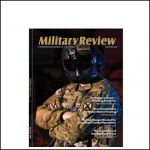
e-Document
|
Military Review, May-June 2009.
Copies
0 Total copies, 0 Copies are in,
0 Copies are out.
Continuing progress during the "year of the NCO". Command Sergeant Major James W. Redmore, U.S. Army; The level of personal and professional maturity of our noncommissioned officer corps is nothing short of remarkable. We have come a long way in the last seven years during the War on Terrorism.
The inclination for war crimes. Lieutenant Colonel Robert Rielly, U.S. Army, Retired; An Army inquiry into the My Lai massacre 36 years ago provides today's leaders with ways to determine if units are tempted to commit war crimes.
The embedded morality in FM 3-24, counterinsurgency. Lieutenant Colonel Celestino Perez, Jr., U.S. Army, Ph.D.; Army doctrine tells us to respect the other's dignity and, hence, the other's life.
"Awakening" beyond Iraq: time to engage radical Islamists as stakeholders. Colonel David W. Shin, U.S. Army; Countering threats from terrorists should be dealt with through international law enforcement and diplomacy, not "preemptive" war.
Detention operations, behavior modification, and counterinsurgency. Colonel James B. Brown, U.S. Army; Lieutenant Colonel Erik W. Goepner, U.S. Air Force and Captain James M. Clark, U.S. Air Force; Camp Bucca, Iraq, has a proactive counterinsurgency strategy to identify detainees who no longer pose a threat, educate and train them, and return them to their hometowns to marginalize extremists.
Direct support HUMINT in operation Iraqi freedom. Lieutenant Colonel Charles W. "Bill" Innocenti, U.S. Army, Retired; Lieutenant Colonel Ted L. Martens, U.S. Army; and Lieutenant Colonel Daniel E. Soller, U.S. Army; To remain operationally agile in the counterinsurgency environment, the HUMINT community must shed some of its old ways of doing business.
Keeping friends and gaining allies: the indivisible challenge of military public relations. Brigadier General Huba Wass de Czege, U.S. Army, Retired; Maintaining and building positive relations with the public must become an integral part of U.S. military operations. Involved populations will increasingly be the arbiters of operational success or failure.
Popular support as the objective in counterinsurgency: what are we really after? Major Lane V. Packwood, Idaho Army National Guard; After filling enough government and security force positions to defeat the insurgents, the counterinsurgent must influence public opinion in favor of the government by finding key individuals in the population's gray networks and securing their support.
Iran and Venezuela: the ""Axis of Annoyance"". Commander Kavon "Hak" Hakimzadeh, U.S. Navy; Iran and Venezuela are a cause for concern for U.S. security policy makers. They have indeed earned the moniker "the axis of annoyance."
It ain't over till it's over: what to do when combat ends. Lieutenant Colonel E. Paul Flowers, U.S. Army; Preserving the peace to secure enduring success requires implementing post-conflict reconstruction.
Arming the force: future class v sustainment. Colonel Alan D. Braithwaite, U.S. Army Reserve; A new strategy focused on "now and into the future" helps logisticians support Joint warfighter readiness with modernized firearms and weapons systems.
Contest winners. 3rd Place DePuy, Counterinsurgency operations in Baghdad: the actions of 1-4 cavalry in the east Rashid security district. Major Thomas J. Sills, North Carolina Army National Guard; By adhering to the COIN principles of "clear-hold-build" and treating Iraqis with dignity, 1-4 Cavalry brought security to a former Al-Qaeda-dominated area in Iraq. 3rd Place MacArthur, The influential leader. Major Enrique Silvela, Spanish Army; Today's military professionals must understand how to influence without authority and how to achieve results within the constraints of a cooperative environment.
Insights. Disunity of command: the decisive element!. Lieutenant Colonel Carl Grunow, U.S. Army, Retired; Unity of Command, once thought an unassailable imperative, can inhibit success in stability operations because legitimacy trumps efficiency.
Book reviews: contemporary readings for the professional.
Letters.
Title
Military Review, May-June 2009.
Call No
CDMC Military Review
Digital Link
Subjects
Language
English
Published
Fort Leavenworth, KS : Combined Arms Center,, 2009.
Series
Target Audience
Unknown or not specified








